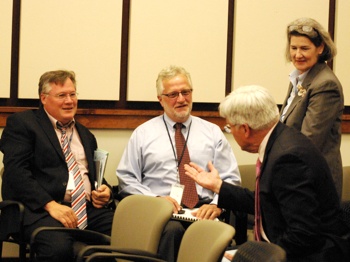Washtenaw County board of commissioners meeting (June 4, 2014): The board’s meeting featured a discussion of how to allocate a budget surplus – prompted by recommendations from the five countywide “electeds.” The elected officials hope to partner with the county board as it sets priorities for the $3.9 million surplus from 2013. The county’s fiscal year is the same as the calendar year.

From left: Commissioner Kent Martinez-Kratz (D-District 1); Bob Tetens, director of parks & recreation; county prosecuting attorney Brian Mackie; and county treasurer Catherine McClary. (Photos by the writer.)
The board, comprised of elected officials representing nine districts, is responsible for budget decisions. The five positions that are elected by voters countywide – the sheriff, prosecuting attorney, treasurer, clerk/register of deeds and water resources commissioner – head up county departments but must have their budgets approved by the board.
The board is developing a process that will guide budget decisions regarding how to manage budget surpluses or shortfalls, including $3.9 million surplus from 2013 and about $600,000 in higher-than-budgeted property tax revenues in 2014. The county administrator, Verna McDaniel, is recommending that the $3.9 million be kept as general fund reserves. Some county commissioners would rather spend at least a portion of the surplus.
The recommendation from the electeds is to allocate a to-be-determined percentage of any surplus to these five areas: (1) unfunded liabilities for the pension fund; (2) unfunded liabilities for the retiree health care fund; (3) the county’s housing fund, which was eliminated in 2012; (4) the delinquent tax fund reserves, specifically for internal advances on county projects to save bonding costs; and (5) the capital reserve fund or unearmarked reserve fund.
Commissioners made no decision on these recommendations, other than to thank the electeds for their input.
In other budget-related action, the board gave final approval to put a 10-year parks & recreation millage renewal on the Nov. 4, 2014 ballot. Commissioners also set public hearings for two millages that are levied annually in December without voter approval – for support of indigent veterans and their families; and to fund economic development and agricultural activities. Those hearings, to solicit public input, will be held at the board’s July 9 meeting.
The board also gave final approval to set the county’s general operating millage rate at 4.5493 mills – unchanged from the current rate. This is an annual process that includes a public hearing, which was also held on June 4. One person spoke.
A final vote was also taken to create a new committee that will explore funding options for road repair. This follows the board’s rejection – at its meeting on May 21, 2014 – of a proposal to levy a countywide tax for this purpose. No committee members have been appointed yet.
The board was also briefed on work by the community corrections unit, which is part of the sheriff’s department. It provides services that include jail diversion and alternative sentencing options to the Washtenaw County Trial Court, pre-trial services, drug testing, and electronic monitoring. The use of electronic monitoring has increased dramatically, from an average number of cases between 25-30 at any given time in FY 2012-2013, to between 85-115 cases in FY 2013-14.
During public commentary, commissioners heard from David Schonberger, an Ann Arbor resident who thanked the board for passing a resolution last month to oppose oil exploration and drilling in the county. He urged them to use it as a starting point for more action. Specifically, he advocated that the board fund a robust public education campaign and establish an advisory committee to work with Scio Township and the city of Ann Arbor on this issue. [Full Story]





